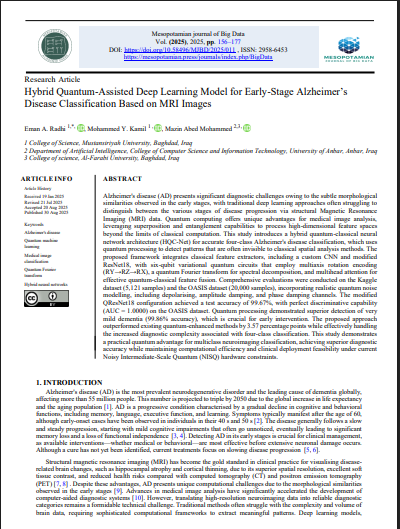Hybrid Quantum-Assisted Deep Learning Model for Early-Stage Alzheimer’s Disease Classification Based on MRI Images
Main Article Content
Abstract
Alzheimer's disease (AD) presents significant diagnostic challenges owing to the subtle morphological similarities observed in the early stages, with traditional deep learning approaches often struggling to distinguish between the various stages of disease progression via structural Magnetic Resonance Imaging (MRI) data. Quantum computing offers unique advantages for medical image analysis, leveraging superposition and entanglement capabilities to process high-dimensional feature spaces beyond the limits of classical computation. This study introduces a hybrid quantum-classical neural network architecture (HQC-Net) for accurate four-class Alzheimer's disease classification, which uses quantum processing to detect patterns that are often invisible to classical spatial analysis methods. The proposed framework integrates classical feature extractors, including a custom CNN and modified ResNet18, with six-qubit variational quantum circuits that employ multiaxis rotation encoding (RY→RZ→RX), a quantum Fourier transform for spectral decomposition, and multihead attention for effective quantum-classical feature fusion. Comprehensive evaluations were conducted on the Kaggle dataset (5,121 samples) and the OASIS dataset (20,000 samples), incorporating realistic quantum noise modelling, including depolarising, amplitude damping, and phase damping channels. The modified QResNet18 configuration achieved a test accuracy of 99.67%, with perfect discriminative capability (AUC = 1.0000) on the OASIS dataset. Quantum processing demonstrated superior detection of very mild dementia (99.86% accuracy), which is crucial for early intervention. The proposed approach outperformed existing quantum-enhanced methods by 3.57 percentage points while effectively handling the increased diagnostic complexity associated with four-class classification. This study demonstrates a practical quantum advantage for multiclass neuroimaging classification, achieving superior diagnostic accuracy while maintaining computational efficiency and clinical deployment feasibility under current Noisy Intermediate-Scale Quantum (NISQ) hardware constraints.
Article Details
Issue
Section

This work is licensed under a Creative Commons Attribution 4.0 International License.
